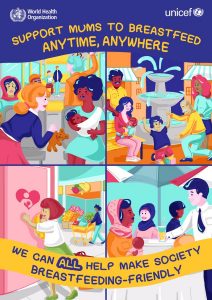Aug
05

Posted by Susan Halpin on August 5th, 2019
Posted in: Blog, NLM Resources, Patient Engagement, Public Health
Tags: baby health, bonding with baby, breast milk, breastfeeding, feeding babies, infant health, nursing, World Breastfeeding Week

The World Health Organization has named the first week of August as World Breastfeeding Week! You can read lots of important health information about breastfeeding on Twitter using #WorldBreastfeedingWeek.
Most of us know that health professionals recommend that babies be breastfed for the first 6 months, if possible. Initially, breastfeeding may require a little time and energy to get the hang of, but usually after a short time, both mother and baby settle into a routine that becomes very convenient.
One of the most important benefits of breastfeeding is the bonding that occurs between mom and baby. According to NLM’s MedlinePlus website (https://medlineplus.gov/) the following bullet points provide other health benefits of breastfeeding:
The National Institute on Drug Abuse or NIDA provides current info about using medical marijuana and other drugs during and pregnancy and breastfeeding. The website also has many helpful materials you can share https://www.drugabuse.gov/nidamed-medical-health-professionals/marijuana-other-drugs .
Another useful tool for breastfeeding mothers is NLM’s LactMed database (https://toxnet.nlm.nih.gov/newtoxnet/lactmed.htm) that  contains information on drugs and other chemicals to which breastfeeding mothers may be exposed.
contains information on drugs and other chemicals to which breastfeeding mothers may be exposed.
LactMed includes information on the levels of such substances in breast milk and infant blood, and the possible adverse effects in the nursing infant. Suggested therapeutic alternatives to those drugs are provided, where appropriate. All data are derived from the scientific literature and are fully referenced. A peer review panel reviews the data to assure scientific validity and currency.